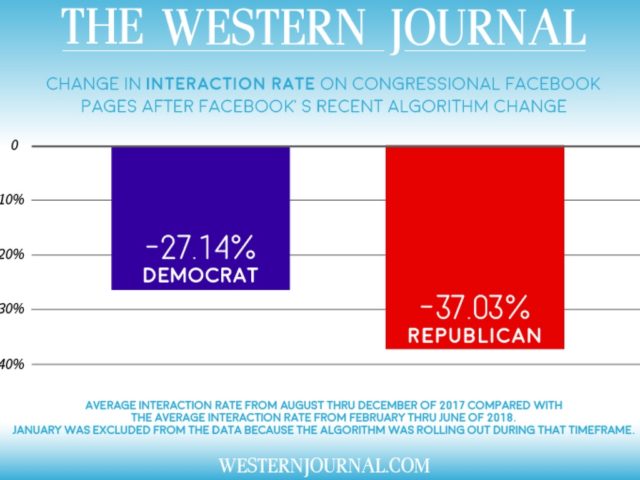The rate of interactions on the Facebook pages of Republican members of Congress dropped by an average of 37 percent following changes to Facebook’s algorithm in January, 10 percent more than Democrat members of Congress, according to an analysis by the Western Journal.
Via the Western Journal:
The Western Journal looked at total interactions — reactions, comments and shares on a post — and interaction rates — average interactions divided by the number of page followers for each page. Regardless of a change in the number of posts or followers, the interaction rate on a given Facebook page should remain similar from month to month, all else being equal. (The graph below is interactive to allow readers to see the data for themselves.)
According to our analysis, the interaction rate on Republican Facebook congressional pages decreased by 37 percent, compared to a change of just over 27 percent on Democrat pages.
Moreover, total interactions on Republican congressional members’ Facebook pages decreased by 34 percent, while total interactions on Democrat congressional members’ Facebook pages decreased by 18 percent.
While interaction rates fell across the board after Facebook’s algorithm change, Republican senators and House members saw a more significant drop in the interaction rates on their Facebook pages than did their Democrat counterparts.
Among senators, the interaction rate on Republican pages decreased by over 44 percent, while Democrats saw a 32 percent decrease.
Previous analysis by the Western Journal revealed that conservative media outlets suffered a greater decline in Facebook traffic than their left-wing and mainstream competitors following the January algorithm change. This was supported by independent research from social media analytics firm NewsWhip, which found a huge boost in Facebook engagement for establishment media and a comparative decline for conservative media. Exclusive analysis by Breitbart News found that Facebook engagement on President Donald Trump’s page declined by 45 percent shortly after January.
Mark Zuckerberg said earlier this year that he wants to promote “high-quality journalism” to Facebook readers and downrank “fake news,” which the Facebook CEO defines as “real media outlets who are saying what they think is true but have varying levels of accuracy or trustworthiness” in addition to “spammers and state actors.”
More recently, after CNN asked the company to explain why InfoWars hasn’t been banned from its platform, Facebook admitted that it reduces the reach of material it considers “fake news” by up to 80 percent.
Allum Bokhari is the senior technology correspondent at Breitbart News. You can follow him on Twitter, Gab.ai and add him on Facebook. Email tips and suggestions to allumbokhari@protonmail.com.

COMMENTS
Please let us know if you're having issues with commenting.